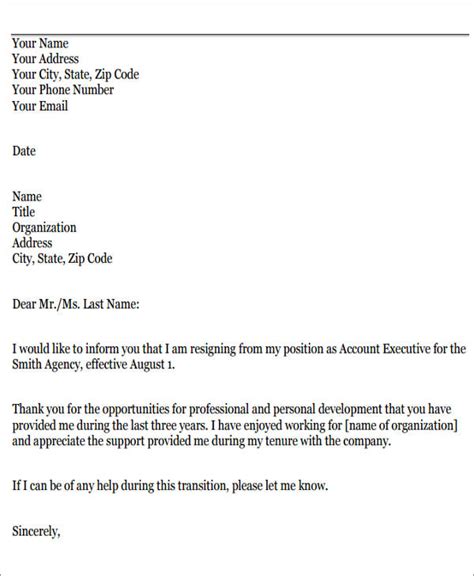Resignation Letters For Personal Reasons: Examples In English

Resigning from a job is never easy, especially when it is due to personal reasons. It can be challenging to put your thoughts and emotions into words, and you may be unsure of how to approach writing a resignation letter. However, it is essential to be professional and courteous when resigning, regardless of the reasons behind your decision. Here are some examples of resignation letters for personal reasons that you can use as a guide.
1. Introduction
Start your resignation letter by addressing your employer or supervisor. Begin with a cordial and respectful tone, expressing your gratitude for the opportunities and experiences you have had while working for the company. Keep the introduction brief and to the point.
2. Reason for Resignation
Explain the reason for your resignation briefly and honestly. You do not have to go into detail if you are uncomfortable doing so. Keep in mind that your personal reasons are confidential, and you do not have to disclose them if you do not want to.
Example:
It is with a heavy heart that I submit my resignation from my position as [job title] at [company name]. My decision is due to personal reasons that require my immediate attention.
3. Notice Period
State your intended notice period and your willingness to help with the transition process. Make sure to review your employment contract or company policy to determine the required notice period and follow it accordingly.
Example:
I intend to fulfill my notice period of [notice period] as stated in my contract. I am willing to assist with the transition process to ensure a smooth handover of my duties.
4. Gratitude
Express your gratitude once again for the opportunities and experiences you have had while working for the company. Thank your employer or supervisor for their support and guidance during your employment.
Example:
Thank you for the opportunity to work for [company name]. I am grateful for the experiences and knowledge I have gained while working here. I appreciate the support and guidance provided by [employer/supervisor’s name] during my employment.
5. Contact Information
Provide your contact information, including your personal email and phone number, so that your employer or supervisor can reach you if necessary. Make sure to also include your last day of work and your signature at the end of the letter.
Example:
My last day of work will be on [last day of work]. Please feel free to contact me at [personal email] or [phone number] if you need to reach me. Thank you for your understanding.
6. Concluding Remarks
End your resignation letter with a positive note, wishing the company and your colleagues the best in their future endeavors. Avoid being negative or critical, and maintain a professional tone throughout the letter.
Example:
Once again, thank you for the opportunities and experiences provided during my time at [company name]. I wish the company and my colleagues all the best and look forward to keeping in touch.
7. FAQs
Q: Do I need to explain my personal reasons for resigning?
A: No, you do not have to disclose your personal reasons if you are uncomfortable doing so. Keep in in mind that your personal reasons are confidential.
Q: How much notice should I give before resigning?
A: Review your employment contract or company policy to determine the required notice period. Follow the notice period stated in your contract or policy to avoid any issues.
Q: Can I resign via email?
A: It is best to resign in-person or via a formal resignation letter. However, if you are unable to do so, you can send a resignation email to your employer or supervisor.
Q: Should I mention any negative experiences or issues in my resignation letter?
A: No, it is best to avoid mentioning any negative experiences or issues in your resignation letter. Keep the letter professional and respectful.
Q: What should I do after submitting my resignation letter?
A: After submitting your resignation letter, make sure to follow up with your employer or supervisor to ensure that they have received it. Begin the transition process and assist with handing over your duties to your replacement.
Conclusion
Writing a resignation letter for personal reasons can be difficult, but it is essential to do so in a courteous and professional manner. Use the examples provided as a guide to help you write your resignation letter. Remember to keep the letter brief, honest, and respectful, and provide your contact information for future reference. Good luck with your future endeavors!
